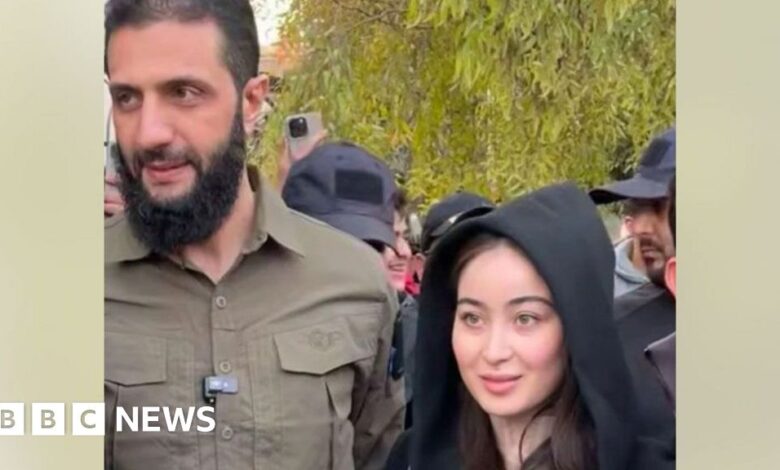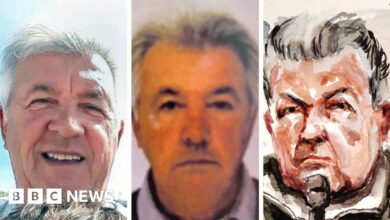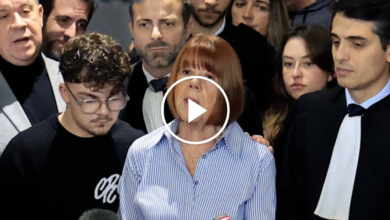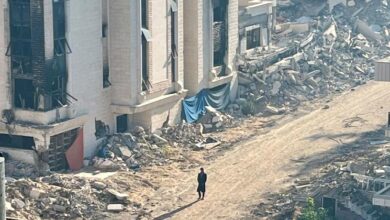The Syrian rebel leader denied the controversy over the photo taken with women

Syrian rebel leader Ahmed al-Sharaa has dismissed an online controversy over videos showing him gesturing to a young woman to cover her hair before taking a photo with her last week.
The incident has sparked criticism from both liberal and conservative commentators amid widespread speculation about the district’s future direction after rebels took power.
Liberals see the request by the head of the Sunni Islamist group Hayat Tahrir al-Sham (HTS) as a sign that he may seek to implement an Islamic system in Syria after taking over. led the overthrow of Bashar al-Assad, while hard-line conservatives criticized him for agreeing to be photographed with the woman in the first place.
“I didn’t force her. But that’s my personal freedom. I want the photos to be taken of me in a way that suits me,” Sharaa said in an interview with the BBC’s Jeremy Bowen.
The woman, Lea Kheirallah, also said she was not bothered by the request.
She said he asked in a “gentle and fatherly way”, and she thought “the leader has the right to present himself in the way he sees fit”.
Still, the incident has highlighted some of the difficulties any future Syrian leader might face in appealing to and uniting such a religiously diverse nation.
Sunni Muslims make up the majority of the population, with the remainder divided into Christian, Alawite, Druze and Ismailis groups.
There are also differing views among the various political and armed groups opposing Assad, with some wanting a secular democracy and others wanting governance under Islamic law.
HTS, a former al-Qaeda affiliate, initially imposed strict rules on behavior and dress when it took control of the former rebel stronghold of Idlib province in 2017. However, HTS has revoked those rules in recent years in the face of public criticism.
The Quran, Islam’s holy book, requires Muslims – men and women – to dress modestly.
Modesty for men is understood to mean covering the area from the navel to the knees – and for women, it is often seen as covering everything except their face, hands and feet when in the presence of others. men to whom they are not related or married.
Lea Kheirallah asked to take a photo with Sharaa – who was previously known by his alias Abu Mohammed al-Jolani – when he toured the Mezzeh area of Damascus on December 10.
Before agreeing, Sharaa signaled her to cover her hair and she did so.pulled up the hood of his sweater and stood next to him to take a photo.
Many video clips and images of the incident were shared on social networks, causing widespread outrage among ordinary users and media commentators.
Those with liberal or non-conservative views saw this as a disturbing look at Syria’s possible future under HTS, fearing increasingly conservative policies such as requiring all women to wear a headscarf or headscarf.
France 24’s Arabic channel discussed the incident, with a headline asking whether Syria is “heading towards Islamic domination”.
Others were harsher in their condemnation. “We have replaced a dictator with a reactionary dictator,” said one Syrian journalist.
On social media, other commentators warned of “extremists” coming to power, while others criticized “forcing a free woman” to adopt conservative views.
Muslim hardliners on Telegram criticized Sharaa for agreeing to be filmed and photographed next to a young woman in the first place.
Some people refer to Ms. Kheirallah as “mutabarijah” – a negative term for women considered to be immodest in their dress or makeup.
Such hardliners range from clerics to influential commentators, whose views are often shared and read by Syria-focused conservative communities online and have access to HTS supporters and possibly officials.
Most of them appear to be based in Syria, mainly in the former HTS-dominated rebel stronghold of Idlib, some of whom previously served in HTS ranks.
They argued that it is not religiously permissible for men and women who are not closely related to interact with each other and accused Sharaa of seeking “useless public attention” and showing off ” indulgence” in matters contrary to strict religious doctrine.
A post on a Telegram channel called Min Idlib (From Idlib) said the HTS leader was “too busy taking selfies with young girls” to address the request to release prisoners from HTS prison in Idlib.
Many conservative figures who spoke out against the photo have previously criticized Sharaa on political as well as religious grounds, including clerics who have left HTS.




